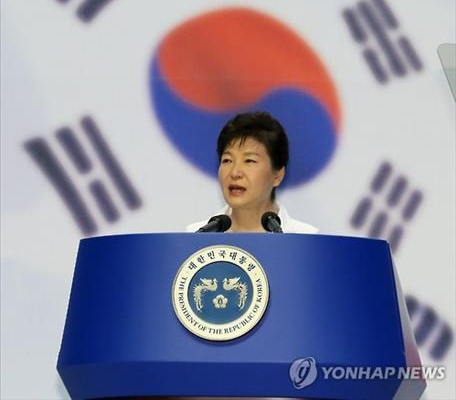Park urges Japan to back up its pledge on history with actions
By 이현정Published : Aug. 15, 2015 - 14:41
President Park Geun-hye urged Japan on Saturday to take sincere actions to back up its pledge to uphold the position on the recognition of history by its previous Cabinets.
South Korea and Japan are close economic partners and key allies of the United States, though they have long been in conflict over territory and other historical disputes stemming from Japan's 1910-45 colonial rule of the Korean Peninsula.
Japan should "demonstrate with consistent and sincere actions its pledge to inherit the recognition of history by the previous Cabinets," Park said in a televised speech marking the 70th anniversary of Korea's independence from Japanese colonial rule.
She said the statement issued by Japanese Prime Minister Shinzo Abe on the eve of the 70th anniversary of the end of World War II left much "to be desired," in an apparent reference to Abe's failure to offer his own clear apology for Japan's militaristic past.
Still, she said South Korea took note that Abe's pledge that the previous Cabinets' position "will remain unshakable into the future."
In 1993, then Chief Cabinet Secretary Yohei Kono issued a landmark statement recognizing the military's involvement in establishing and operating "comfort stations," a euphemism for brothels where hundreds of thousands of Korean and other Asian women were forced into sexual slavery.
Two years later, then Prime Minister Tomiichi Murayama acknowledged and apologized for the suffering his country inflicted on neighboring nations, including Korea, through its aggressions in the early part of the 20th century.
Park's comments came a day after Abe said Tokyo "has repeatedly expressed the feelings of deep remorse and heartfelt apology for its actions during the war."
Park also pressed Japan to resolve the issue of the elderly Korean women who were forced to serve as sex slaves for Japan's World War II soldiers -- one of the knottiest issues between the two countries.
South Korea and Japan are close economic partners and key allies of the United States, though they have long been in conflict over territory and other historical disputes stemming from Japan's 1910-45 colonial rule of the Korean Peninsula.
Japan should "demonstrate with consistent and sincere actions its pledge to inherit the recognition of history by the previous Cabinets," Park said in a televised speech marking the 70th anniversary of Korea's independence from Japanese colonial rule.
She said the statement issued by Japanese Prime Minister Shinzo Abe on the eve of the 70th anniversary of the end of World War II left much "to be desired," in an apparent reference to Abe's failure to offer his own clear apology for Japan's militaristic past.
Still, she said South Korea took note that Abe's pledge that the previous Cabinets' position "will remain unshakable into the future."
In 1993, then Chief Cabinet Secretary Yohei Kono issued a landmark statement recognizing the military's involvement in establishing and operating "comfort stations," a euphemism for brothels where hundreds of thousands of Korean and other Asian women were forced into sexual slavery.
Two years later, then Prime Minister Tomiichi Murayama acknowledged and apologized for the suffering his country inflicted on neighboring nations, including Korea, through its aggressions in the early part of the 20th century.
Park's comments came a day after Abe said Tokyo "has repeatedly expressed the feelings of deep remorse and heartfelt apology for its actions during the war."
Park also pressed Japan to resolve the issue of the elderly Korean women who were forced to serve as sex slaves for Japan's World War II soldiers -- one of the knottiest issues between the two countries.

The issue of the sex slaves has gained urgency as the victims are dying off. In 2007, more than 120 South Korean victims were alive, but the number has since dropped to 47, with their average age standing at nearly 90.
Historians estimate that more than 200,000 women, mostly Koreans, were sexually enslaved by Japanese troops during World War II.
In Tokyo, Haruko Arimura, the minister in charge of women's empowerment, visited a controversial shrine, which honors millions of Japan's war dead, including 14 convicted World War II criminals.
Abe instead sent a ritual offering to the Yasukuni Shrine through one of his aides to mark the 70th anniversary of the end of World War II, Japanese media reported.
South Korea and China view the Yasukuni Shrine as a symbol of Japan's past imperialism. Japan controlled much of China in the early part of the 20th century.
Also Saturday, Park warned of retaliation against North Korea for its possible provocations, but she also called for cooperation to promote peace on the divided peninsula.
South Korea "will sternly deal with any North Korean provocations," Park said in the speech, adding that provocations and threats will only result in North Korea's isolation and destruction.
Park's warning came hours after North Korea threatened to carry out "indiscriminate strikes" on South Korea unless Seoul halts anti-Pyongyang broadcasts along their border.
South Korea resumed the propaganda broadcasts on Aug. 10 in retaliation against a land mine explosion inside the demilitarized zone that left two South Korean soldiers severely injured. South Korea has accused the North of planting the mines in violation of the Armistice Agreement that ended the 1950-53 Korean War.
On Friday, North Korea's powerful National Defense Commission denied Pyongyang's involvement in the land mine attack and demanded that Seoul provide solid proof. (Yonhap)




![[Herald Interview] 'Amid aging population, Korea to invite more young professionals from overseas'](http://res.heraldm.com/phpwas/restmb_idxmake.php?idx=644&simg=/content/image/2024/04/24/20240424050844_0.jpg&u=20240424200058)











![[KH Explains] Korean shipbuilding stocks rally: Real growth or bubble?](http://res.heraldm.com/phpwas/restmb_idxmake.php?idx=652&simg=/content/image/2024/04/25/20240425050656_0.jpg&u=)

